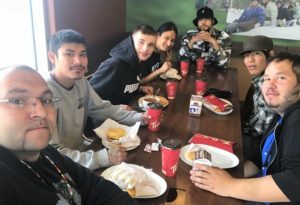Alberta-based community services organization breaks down addiction stereotypes through film

By Rick Garrick
ALBERTA—An Alberta-based community services organization, Boyle Street Community Services, recently posted two Indigenous films on Youtube to raise awareness and help break down stereotypes on addiction and overdoses.
“It’s not just an Alberta issue, but we’ve been dealing with obviously fentanyl, carfentanyl and just opioid addictions and overdoses at a very extreme [level], like an epidemic over the last couple of years,” says Chris Beausoleil, Indigenous high risk youth worker at Boyle Street Community Services in Edmonton. “The Alberta government was looking for a way to inform people and help save lives, so we received a grant from the Alberta government to make two films to help assist with this epidemic we are dealing with.”
Beausoleil says six Indigenous youth, who were all experiencing poverty and/or homelessness, were hired for the film project.
“The first film is called Better Days: A Journey of our Youth, and it is a dramatization of a collective understanding of lived experiences of what we’ve been through together,” Beausoleil says. “The goal of it was to teach people how to use a Naloxone kit – Naloxone is the medication that reverses an overdose.”
Beausoleil says the film, which runs for 19:46 minutes, features a youth overdosing at a party and his friends panicking because they don’t know what to do. After the youth dies, his friends are taught how to use a Naloxone kit to save lives.
“Myself and my team have been trained on how to use the Naloxone kit a couple of times,” Beausoleil says. “And we’ve been to a couple of overdoses where we’ve had to use it on our clients.”
The first film is posted on Youtube.
Beausoleil says the second film, Talk to Save Lives Documentary, which runs for 18:19 minutes, is aimed at creating conversation and breaking down stereotypes about addictions and opioid use.
“We had everybody talk about it, not just certain individuals,” Beausoleil says. “So we set out to do interviews with just random people at a bunch of different venues. One of the places we were able to go to was the Poundmaker’s Pow Wow here in Alberta. We also wanted to get some of our people who are actively using to talk about that, so we came down to our inner city here in Edmonton and we talked to both frontline workers as well as people who are actively using.”
The second film is also available on Youtube.
“This project wasn’t just a film project, per se, because we did attend a lot of ceremonies,” Beausoleil says. “We did a lot of background training with the cameras, lighting, acting and harm reduction approach and of course the cultural knowledge we were passing on to them.”
Beausoleil says there has been a “positive” response to the films.
“People really appreciated the videos,” Beausoleil says. “[For] a lot of people, it was hard for them to watch, which is why we have a trigger warning in effect for it.”
Beausoleil says First Nation communities in northern and southern Alberta and an organization in Toronto have requested premieres of the films for their citizens.
“As well, we have applied to a few different film festivals,” Beausoleil says. “Ultimately, the end goal of this was to save lives. We’ve buried quite a few of our young people out here, and just two weeks before our premiere we had one of our close and popular well-liked youth pass away from an overdose.”


